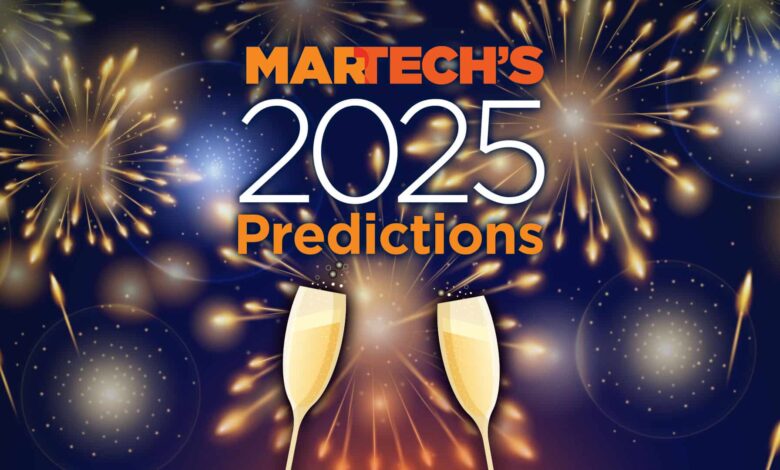AI Transformation: Predictions for 2025

The last year has seen a lot of potential with all kinds of AI-based tools and updates. Studies also show that marketers hone their skills and organizations plan to continue investing in AI in the coming year. Many transformations are underway, but what does this mean in practice?
This means that many companies will recruit new people to support the change. And they will use data and other marketing resources in new ways to stay competitive in this evolving environment. Here are some areas where organizations will adapt and leverage AI tools and processes in 2025.
AI Councils and AI Directors
With the influx of AI-powered tools and processes available on the market, businesses will look to adapt with new hires and restructuring. Many companies will form AI councils or hire Chief AI Officers to lead AI transformation.
“I expect these initiatives and hires to increase in 2025,” said Eric Williamson, chief marketing officer of conversational intelligence company CallMiner.
Williamson explained: “On the one hand, informed adoption decisions can help ensure that your AI investments deliver the value you expect, whether that’s improving customer experience, improving operational efficiency, support contact center agents or other objectives. On the other hand, involving an unnecessary number of decision-makers can slow down or even disrupt procurement processes, causing organizations to fall behind AI. Organizations must balance agility with responsible adoption of AI if they want to remain competitive.
Dig Deeper: How to reframe AI adoption to focus on outcomes rather than tools
Automating data analysis and enrichment
One of the main ways marketers will leverage AI in 2025 will be to enrich and analyze their data. For example, AI-based tools can reduce the time and increase the efficiency of scoring and identifying ideal customer profiles (ICPs), i.e. the customers or prospects most likely to spend a lot of money.
“I’m excited about how AI is helping to modernize the way marketers, especially in B2B, approach the age-old problem of KPI analysis and account data enrichment,” said Gurdeep Dhillon, marketing director of Contentstack, a composable CRM. “New ways of approaching KPI determination, along with the automation of account data and research, will help marketing and business development evolve and leverage their technology stack more effectively.”
The ability to quickly analyze and activate using AI-driven capabilities will have implications across the entire martech stack. As this applies to customer experience, marketers will have the firepower to implement hyper-personalization. They will have real-time data insights and genAI content production to quickly deliver hyper-personalized messages and experiences.
“The number one use case I see is finally delivering on the promise of personalization,” Dhillon said. “Real-time audience and content insights, combined with brand genAI, will make hyper-personalization at scale a reality.” »
Dhillon added, “Marketers will use modern DXPs with CMS, Personalization Engine, Real-time CDP and LLMs. plus RAG (generation augmented by recovery)and automation tools to achieve this. The biggest challenge marketers will face will be getting personalization logic in place first. AI will help refine and optimize, but the team must define the initial strategy.
Dig Deeper: The AI-powered path to smarter marketing
Redefining content optimization for commercial search genAI
If you’re in e-commerce, AI is already changing the game with genAI search tools like Amazon RUFUS. Customers aren’t just using keywords to find products and brands, they’re searching in a more conversational way. This means customers ask general questions, describe purchasing opportunities, request product comparisons, and ask follow-up questions.
To keep pace and stay among the best in this environment, marketers will need to optimize content to cover a wider range of contexts.
“GenAI business research will bring a renewed focus on content optimization and increased requirements for content refreshment,” said Megan Harbold, vice president of strategy and growth for the omnichannel marketing platform. Skai. “GenAI research, like RUFUS, will move out of the testing stage and into the normal behavioral flow of online shopping. »
Harbold explained: “Marketers will need to evolve how they harvest keywords, optimize product content, and target contextually in order to stay relevant as models refine the definition of search. This will result in increased investments in technology to optimize product content and dynamically modify content and creative as contextual targets are refined.
Integrate Causal AI
In the new year, AI will not only be used to scale up analysis and content creation. AI will also be used to analyze scenarios and assist in decision-making. This is the category of AI tools called “causal AI.”
Dig Deeper: Why Causal AI is the Answer to Smarter Marketing
“Without a doubt, in 2025 and beyond, a lot of energy will be spent integrating causal AI with generative AI and large language models,” said Mridula Rahmsdorf, CRO at IKASI, an AI company. Causal AI offering tools for retailers and financial services. “Current machine learning models are still extremely useful across multiple disciplines and are expected to be upgraded in the coming year. Causal AI – integrated into these forms of AI – will significantly improve accuracy and improve decision-making, particularly when decision-making involves multiple seemingly conflicting indicators based on correlations rather than causal relationships.
Rahmsdorf adds: “Integrating causal AI will also strengthen the reliability of generative AI by giving it a deeper and broader understanding of how different factors interact and affect each other. Therefore, look to generative AI to be better able to present scenarios that reflect realistic outcomes, leading to more consistent and relevant results.
“As causal AI becomes more deeply integrated into other AI technologies and confidence in causal inference increases significantly based on accurate results, its use to help drive impact hardware in various use cases across industries will increase significantly.



